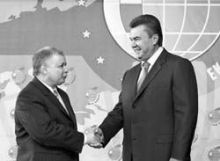On Sept. 6 Prime Minister Viktor Yanukovych of Ukraine flew on his first working visit to Poland, formally to take part in the 16 th Economic Forum “Krynica 2006,” where he was slated to meet with his Polish counterpart, Jaroslaw Kaczynski. This event is traditionally attended by Ukrainian prime ministers or presidents. Last year, Ukraine did not attend because of the prime ministerial crisis.
The Polish side has been looking forward to the new Ukrainian prime minister’s visit because the Polish leadership wants to hear directly from him the plans of the Ukrainian government, the first in the history of Ukraine to be formed from a parliamentary opposition dominated by Yanukovych’s party. It is expected that our prime minister’s views on Ukraine’s European integration and cooperation with Poland will be publicized during the forum. Individual aspects of this cooperation will be discussed during later talks in person.
PAP, Poland’s news agency, reported that the forum in Krynica Zdroj (popularly known as Krynica Gorska), would be attended by an 11-person Ukrainian delegation, proof of Ukraine’s attention to its relations with Poland. The forum’s topic, economic security, set the tone for the Ukrainian-Polish talks. Above all, this refers to an issue that is acutely important to both sides, namely the extension of the Odesa- Brody pipeline to the Polish city of Plock. The Poles expect the new Ukrainian prime minister to clarify the Ukrainian government’s stand on this project.
In an interview with Polish journalists, Yanukovych made it clear that he is in favor of extending the pipeline. He explained that it is being used in the reverse mode because it cannot stay empty. “Ukraine is benefiting from the Odesa-Brody pipeline being used in the so-called reverse mode. This will continue until the Polish section of the pipeline is built and until it is determined what kind of oil will fill the pipeline. We should remember that Odesa-Brody was built to secure diversified oil supplies...We have wasted a lot of time and it’s time we corrected this mistake,” Yanukovych is quoted as saying by the Polish newspaper Rzeczpospolita.
In an interview with PAP, the Ukrainian prime minister noted that the project to extend the Odesa-Brody pipeline will allow Ukraine and Europe to diversify energy supplies, which, Yanukovych believes, will unite the economic interests of both Ukraine and Poland. At the same time he warned that practical activity is needed in addition to political will. “If we create the right conditions for oil suppliers and consumers, this project will be implemented, and this issue does not have to be politicized,” noted Prime Minister Yanukovych.
Ukrainian Fuel and Energy Minister Yuriy Boiko is obviously governed by practical considerations. In a recent interview with journalists, he said that it will be possible to transport Caspian oil to Europe through the Odesa-Brody pipeline in two or three years. That is the exact amount of time needed to extend the pipeline to Plock. Boiko believes that this pipeline will offer oil suppliers competitive prices and that talks should be held in Ukraine with companies that own resources in the Caspian region, and that the dynamics of their progress and production and foreign trade balance should be understood. The minister says that the Odesa-Brody oil pipeline’s tariff policy will be formed with an eye to the progress of the construction of the Burgas-Alexandropulos pipeline.
Interestingly, Boiko did not attend the Polish economic forum, although PAP reported on Sept. 6 that the fuel and energy minister was a member of the Ukrainian delegation. Boiko was apparently busy attending to more important matters in Moscow. He flew there on Sept. 6 for talks with Gazprom’s chairman of the board Aleksei Miller. Ukraine’s First Deputy Minister Vadym Chuprun told journalists that they would be discussing natural gas supplies to Ukraine in 2006-2007.
Analysts say that despite the current Ukrainian government’s pro- Russian rhetoric, the business interests of Yanukovych supporters do not always tally with Russia’s interests. Therefore, the possibility of Ukraine’s closer cooperation with Europe — particularly with Poland with regard to the pipeline to Plock — should not be ruled out.
FROM THE DAY’S FILES
By the end of 2001, Uktransnafta had completed the construction of the Odesa-Brody oil pipeline (e.g., Pivdenny Oil Terminal — Odesa- Brody), which is 674 km long and with an annual nine-million-ton capacity. By late May 2003 Ukraine, Poland, and the European Union had signed a declaration supporting the transportation of Caspian oil through the Odesa-Brody pipeline and extending it to the Polish city of Plock, from where oil could be supplied to Gdansk along the existing oil pipeline.
Beginning in mid-2003, Ukraine started actively discussing the direction in which the Odesa-Brody pipeline could be applied. TNK-BP, a Russian-British joint venture, insisted on the pipeline’s reverse mode. On Feb. 3, 2004, the Ukrainian government decided to apply the forward mode, but changed its mind that same year. In late July, Ukrtransnafta and TNK- BP signed a contract whereby Odesa-Brody would pump nine million tons of oil a year to the Pivdenny Terminal (Odesa). The terms of the contract included the transportation of nine million tons a year of Russian Urals-grade oil along the Mozyr-Brody-Pivdenny route for a period of three years. Uktransnafta’s supervisory board resolved to extend Odesa-Brody to Plock in Poland and set up Sarmatia, a joint venture involving PERN Przyjazn.
What will be the results of the Krynica forum? Will the Polish and the Ukrainian prime ministers use this occasion to provide fresh impetus to the Odesa-Brody project and help extend the pipeline to Plock?








